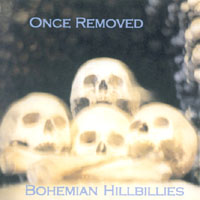Exploring exotic New Jersey
Yes, exotic. In our 24-hour tour of the Garden State, we ate seafood by the sea at one of the best places to do that, Bahr's Landing (click here for live webcam image) in Highlands, New Jersey, then mozeyed along part of what the locals call "da shore," turned inland and found a desert oasis, complete with pyramids, banana-coconut palms, and a jacuzzi. We decided to spend the night there. This morning after dropping off our rental car, we found another New Jersey treasure right next door: Foodmart International, a 138,000-square-foot building that takes up a whole block, the super-est supermarket we've ever seen. Some sources say it's "run by the United Nations' Food and Agriculture Organization," while others say otherwise. Following journalism's traditional three-source rule (if you don't have it from three sources, you can't report it), then I don't know whose store it is. The sources do agree that it's a special international trade zone, which might explain why many of the items they sell cost less than a third of the prices in more conventional stores, and why it has food from everywhere, some of it in packages with nary a word of English. It's been there awhile, apparently, but they don't advertise in English, just Spanish, Korean, Chinese, Japanese and Vietnamese (and maybe Thai). We can't wait to go back — to all three places.
posted by Janet Dagley Dagley @4:46 PM
|
15.3.03  |
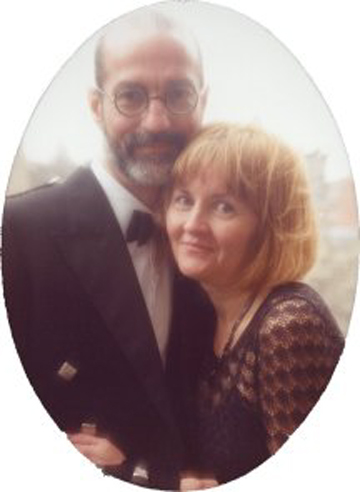
(Photo by Mark Bryce)
Whose business is it, anyway?
“You can’t marry your cousin! You’ll have cross-eyed children!”
“So, how are you inbred lovebirds doing?”
“Aren’t you afraid you’re contaminating the gene pool?”
(examples of various comments we’ve heard over the years, the first in 1958, the other two as recently as 2002)
“When the principles of breeding and of inheritance are better understood, we shall not hear ignorant members of our legislature rejecting with scorn a plan for ascertaining by an easy method whether or not consanguineous marriages are injurious to man.”
— Charles Darwin, who married his first cousin, Emma Wedgewood
Six years and one day ago, in Edinburgh, Scotland, United Kingdom, the people in this photo did something that’s very common, and legal, in all the world outside the U.S., but prohibited in Arkansas, Delaware, Idaho, Iowa, Kansas, Kentucky, Louisiana, Michigan, Minnesota, Mississippi, Missouri, Montana, Nebraska, Nevada, New Hampshire, North Dakota, Ohio, Oklahoma, Oregon, Pennsylvania, South Dakota, Washington, West Virginia, Wyoming, and permitted with restrictions in Arizona, Illinois, Indiana, North Carolina, Maine, Utah, and Wisconsin. All of that is illustrated in a color-coded map at one of several web sites about cousin marriage.
About a year ago, the newswires were abuzz with a story The New York Times headlined: "No Genetic Reason to Discourage Cousin Marriage, Study Finds"
Here's the lead on that story, reproduced here under the "fair use" provision of U.S. copyright law:
“Contrary to widely held beliefs and longstanding taboos in America, first cousins can safely have children together, without a great risk of birth defects or genetic disease, scientists are reporting today. They say there is no biological reason to discourage cousins from marrying.”
CNN also covered that story: medical reporter Elizabeth Cohen told us that even though there was no scientific reason why cousins shouldn't be allowed to marry, there was still what she called "the yick factor." Good thing she didn't inject her opinion into that report. Later the same day, "TalkBack Live" host Arthel Neville declared that even though there was no medical reason to prohibit it, she thought cousin marriage was "disgusting." Arthel, you're probably not old enough to remember this, but once upon a time there in your neck of the woods, they had these things called anti-miscegenation laws, which prohibited interracial couples from marrying or even hanging out together, because a lot of people considered that "disgusting." Today a TV talking head, even on the right-wing channels, who expressed such an opinion would not likely be seen on the air again for a long, long time. Coincidentally, nearly a year after she declared us "disgusting," Ms. Neville's show got cancelled.
Last year's story wasn't exactly breaking news: Nobel-Prize-winning geneticist Dr. Joshua Lederberg said pretty much the same thing in a 1977 letter to syndicated advice columnist Ann Landers.
Here’s a more recent news item that illustrates just how silly all those laws are, since according to the most recent U.S. census, whether people are legally married has less and less to do with whether they have children, together or otherwise:
“Unmarried men and women who live together are nearly as likely as married couples to be raising children, according to a census report to be released today.”
Anthropologist Martin Ottenheimer has written a book about all this, Forbidden Relatives: The American Myth of Cousin Marriage, published by the University of Illinois Press.
Here are some other resources about cousin marriage. Google lists them under "alternative lifestyles."
Special thanks to my advisor during my two years at Wright State University in Dayton, Ohio, Dr. A.K.M. Aminul Islam of Bangladesh, professor of anthropology, who happened to mention the cross-cousin marriage traditions of certain Philippine tribes in one of his classes back in 1970. Even though I did not become an anthropologist (or even a college graduate) after all, I did remember that story, and after Michael and I found each other and began corresponding, I looked up the words "Philippine" and "cross cousin" on the Internet. That led me to this page, which details a similar form: patrilineal parallel cousin marriage. Thank you, Dr. Islam, thank you, University of Manitoba, and thank you, Jane Matheson for making it all legal and official, no matter what anybody in Kentucky, or on CNN, may think.
posted by Janet Dagley Dagley @8:02 AM
|
14.3.03  |
50 years ago today:
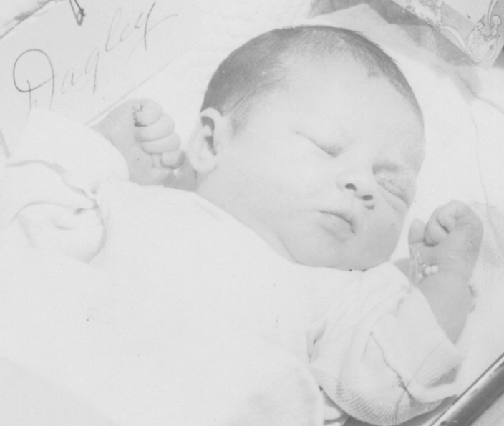
posted by Janet Dagley Dagley @10:33 AM
|
13.3.03  |
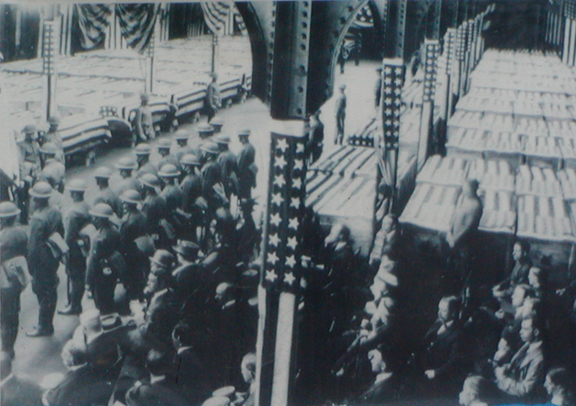
Heaven, Hell, or Hoboken: Last in a Series
There was a catch to General John Pershing's promise of "Heaven, Hell, or Hoboken:" many of those who got the first two options still had to pass through Hoboken on their way home to their final resting places, since Hoboken's combined rail, train, and subway terminal was (and still is) the main hub connecting the New York metro area with the rest of the United States. The ferry terminal section has been unused for more than 25 years, but a restoration project is about to begin. The train station has already been restored (thank you, Sen. Frank Lautenberg). Here's an old postcard showing the terminal.
The doughboys' "War to End All War" couldn't accomplish that, and these days it seems war may never end. And these days, war isn't just somewhere "over there."
The first World War began in 1914 with an assassination in one of the Balkan states that later became Yugoslavia. Today, in another of those Balkan republics that were once Yugoslavia, there was another assassination: Serbian Prime Minister Zoran Djindic, 50, was gunned down in Belgrade. Djindic was active in the opposition to former Yugoslav President Slobodan Milosevic, who finally gave up power in 2000 and is now on trial for war crimes. It was Djindic who turned Milosevic over to the International Tribunal in the Hague.
Like these flag-covered doughboys, Djindic was trying to make the world a better and more peaceful place when he died. It's up to the rest of us to keep working toward that goal. While it would be nice if we could agree on how to go about that, those who can disagree peacefully and respect each other despite those disagreements are showing us the way.
I was going to end there, but I can't sign off without making note, as most everybody in the media has done all day, of the revised menus in the U.S. House of Representatives' cafeteria, where "Freedom Fries" and "Freedom Toast" have replaced the fries and toast previously known as French. It was Rep. Bob Ney of Ohio and Rep. Walter Jones of North Carolina, neither of whom has apparently ever been to Europe, who represented their constituents by making that happen.
Gentlemen, the French don't call the things "French fries" or "French toast" in the first place! All you guys are accomplishing with this, aside from wasting your time and our tax dollars, is demonstrating ignorance of and to the rest of the world.
In France, what we call fries — whether French, freedom, curly or cheese — are called "pommes frittes," which is short for "pommes de terre frittes," which is "fried apples of the earth," or "fried potatoes." They eat them with mayonnaise, but we won't go into that here. If they ever do refer to them as fries, they call them "Belgian fries."
In France, what we call "French toast" is known as "pain perdu," or "lost bread."
Taking the "French" out of fries and toast is kind of like trying to take the "Dutch" out of "Pennsylvania Dutch" to protest the actions of The Netherlands. The term "Pennsylvania Dutch" came from the language early immigrants spoke there, the name of which sounded something like "Dutch" to English-speakers. And sure enough, "Deutsch" does sound a lot like "Dutch" — the languages are related, to each other and to English. If the likes of Ney and Jones had been in Congress during World War I, when sauerkraut became "liberty cabbage," they might also have changed "Pennsylvania Dutch" to "Pennsylvania Freedom," because the Pennsylvania Dutch were GERMAN.
Besides, as a friend of mine pointed out this morning, trying to control the language like that "COULDN'T BE MORE FRENCH IF YOU PUT A BERET ON IT."
What's next: no turkey for Thanksgiving unless the U.S. gets to use military bases in the country with the same name?
So for Reps. Ney and Jones, and for our friends the French, who helped us win the American Revolution and who have been on our side ever since even though we have not always agreed, let's bring in one more song from World War II. You can hear a 1915 rendition of "Mademoiselle from Armentieres" in the vintage audio collection at Firstworldwar.com.
Mademoiselle from Armentieres
by Harry Carlton and Joe Tunbridge
Mademoiselle from Armentieres, Parley-voo?
Mademoiselle from Armentieres, Parley-voo?
Mademoiselle from Armentieres,
She hasn't been kissed in forty years,
Hinky, dinky, parley-voo.
Mademoiselle from Armentieres, Parley-voo?
Mademoiselle from Armentieres, Parley-voo?
She had the form like the back of a hack,
When she cried the tears ran down her back,
Hinky, dinky, parley-voo.
Mademoiselle from Armentieres, Parley-voo?
Mademoiselle from Armentieres, Parley-voo?
She never could hold the love of man
'Cause she took her baths in a talcum can,
Hinky, dinky, parley-voo.
Mademoiselle from Armentieres, Parley-voo?
Mademoiselle from Armentieres, Parley-voo?
She had four chins, her knees would knock,
And her face would stop a cuckoo clock,
Hinky, dinky, parley-voo.
Mademoiselle from Armentieres, Parley-voo?
Mademoiselle from Armentieres, Parley-voo?
She could beg a franc, a drink, a meal,
But it wasn't because of sex appeal,
Hinky, dinky, parley-voo.
Mademoiselle from Armentieres, Parley-voo?
Mademoiselle from Armentieres, Parley-voo?
She could guzzle a barrel of sour wine,
And eat a hog without peeling the rind,
Hinky, dinky, parley-voo.
The MPS think they won the war, Parley-voo.
The MPS think they won the war, Parley-voo.
The MPS think they won the war,
Standing guard at the café door,
Hinky, dinky, parley-voo.
The officers get the pie and cake, Parley-voo.
The officers get the pie and cake, Parley-voo.
The officers get the pie and cake,
And all we get is the bellyache,
Hinky, dinky, parley-voo.
The sergeant ought to take a bath, Parley-voo.
The sergeant ought to take a bath, Parley-voo.
If he changes his underwear
The frogs will give him the Croix-de-Guerre,
Hinky-dinky, parley-voo.
You might forget the gas and shells, Parley-voo.
You might forget the gas and shells, Parley-voo.
You might forget the groans and yells
But you'll never forget the mademoiselles,
Hinky, dinky, parley-voo.
Mademoiselle from Armentieres, Parley-voo?
Mademoiselle from Armentieres, Parley-voo?
Just blow your nose, and dry your tears,
We'll all be back in a few short years,
Hinky, dinky, parley-voo.
posted by Janet Dagley Dagley @3:50 PM
|
12.3.03  |
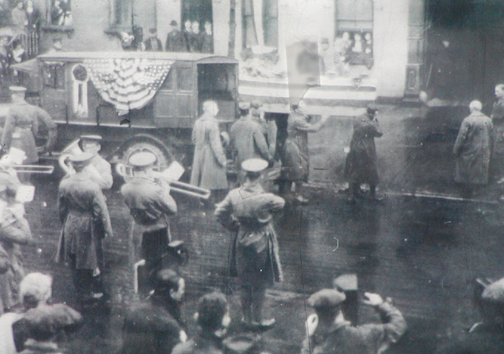
Heaven, Hell, or Hoboken: Third in a Series
This can't be just another soldier: either he was the first casualty to be brought home, or someone of very high rank. With 48,909 American casualties, there couldn't have been enough bands to escort them all from the pier to the train station for the last leg of their journey home, and each one wouldn't have gotten a big flag-draped hearse, or a photographer to record the event for posterity. And look at the people crowded into doorways and windows to watch. They wouldn't have been doing that for just anybody, even if he did make the ultimate sacrifice for his country.
Unfortunately, there is no information with this photo, at least not on the monument itself.
More than three million American soldiers fought in "The War to End All Wars;" the Veterans Administration estimates there are fewer than 5,000 still with us today.
One doughboy, Private Clair M. Pfennig of Bristol, Connecticut, kept a diary during the war, and author Anthony Finan turned it into a book, All for Heaven, Hell, or Hoboken. I haven't read it yet; just found out about it today by doing a Google search on the phrase "Heaven, Hell, or Hoboken."
Here's an excerpt:
"Reached Barracks with baggage at 3:30 A.M. Turned in at night on floor. Better than box cars. had little sleep, eat breakfast and visited the French village. All of stone -- manure piles in street. You judge the hospitality and money of a place by the size of the manure pile. Took shoes off first time in four days and washed hands and face. Not able to take bath or wash any thing. Feeling good but tired. Barracks used before by 165th Infantry of Rain Bow Division on arrival.
Gen Pershing Passed in auto at retreat."
posted by Janet Dagley Dagley @6:54 PM
|
11.3.03  |
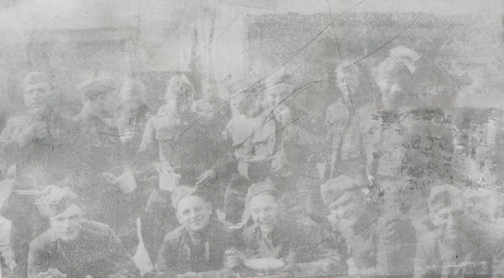
Heaven, Hell, or Hoboken: Second in a Series
There's nothing wrong with your computer screen. These faded faces are all that remain of this image, at least the copy that's posted on the Pier A monument marking the spot where America's troops left to fight in what was then known not as "World War I" but as "The Great War" or "The War to End All Wars."
Maybe that's why these guys were smiling: they believed they were going off not just to fight a war, but to end war itself.
Like the faces of these doughboys, memories of that war have faded with time, and now, more than 86 years after those young men got on the boat to Europe, few veterans remain to tell the tale. Nobody even remembers why they were called doughboys in the first place; you'll find a few theories here.
"Over There" was one of the most popular war songs of the day; it and others are immortalized in the Joseph M. Bruccoli Great War Collection at the University of South Carolina. Bruccoli fought in eight major battles and never fully recovered from the serious wounds he received. His son Matthew J. Bruccoli, better known for being the world's foremost expert on the life and work of writer F. Scott Fitzgerald, funded the project as a way of honoring his father's memory.
I heard another popular World War I song one night a few years ago in a small Bohemian village (Bohemia is part of the Czech Republic, which was once part of Czechoslovakia, which was part of the Austro-Hungarian Empire before "The Great War.") One of the very best books about that war, or any war, is the hilarious picaresque novel The Good Soldier Svejk by Jaroslav Hasek. And in my opinion, the best film on the subject is the original All Quiet on the Western Front. That's the 1930 version, and the trenches where the movie doughboys fought are now the site of Fashion Island, the most upscale of many upscale shopping malls in Orange County, California.
Back to that night in Bohemia: I was at a party at the village firehouse, a party with a live band: drummer, accordionist, violin, various horns, the youngest of them in his 70s, and these guys were polka-ing hardy. They insisted that their guests share a drink, in this case a greenish liqueur that turned out to be absinthe. After our toast, the drummer, who spoke not a word of English, began to sing:
"It's a long way to Tipperary,
It's a long way to go
It's a long way to Tipperary
It's a long way to go
It's a long way to Tipperary
It's a long way to go..."
That was the only part he remembered. He then explained, in Czech, of course, that the Americans who had come through the village in that war had taught him the song. He had waited more than seven decades, through the Nazi Germany years, through Communism, for the chance to sing it to, and with, Americans once more.
I didn't know any more of the song than he did, but that didn't matter. We sang and sang and sang those same lines over and over, until it was time for the next round of absinthe.
We didn't sing "Over There," that night, but perhaps it will enjoy a revival in this century, because whether there's an actual war with Iraq or not, more than a quarter million Yanks are already in the region, they won't come back till it's over over there, and some won't be coming back at all.
posted by Janet Dagley Dagley @6:25 PM
|
10.3.03  |
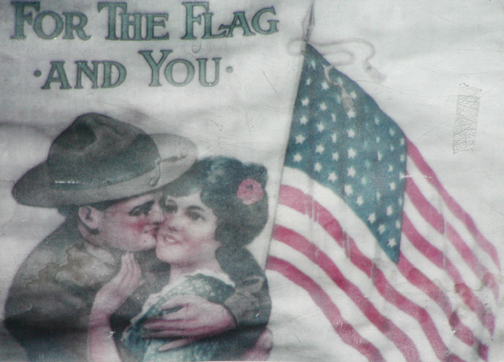
Heaven, Hell, or Hoboken: First in a Series
There's a small monument on the other side of this mile-square town, at the foot of Pier A — now a park, but for centuries one of the busiest piers on the New York Harbor waterfront. In 1917, Pier A was the port of embarkation for the American "doughboys" who joined the fray in the final year of World War I. Among those was one George Washington Dagley, our grandfather. He was one of 237,135 U.S. soldiers wounded "over there" (as the song goes), which won him the best of the three choices mentioned in General John Pershing's classic line, "Heaven, Hell, or Hoboken." After recovering from his wounds in New Jersey, he went home to the hills of Tennessee. 48,909 other American soldiers weren't so lucky; they got one of the other two choices and never saw Hoboken again.
This picture, one of several on that monument, illustrates a scene common in those days as well as these, illustrating as well one of John Prine's best lines: "And all the news just repeats itself, like some forgotten dream, that we've both seen."
There's also a newer monument nearby, to our city's 53 victims of the attacks on the World Trade Center. Hoboken lost a higher percentage of its citizens in those attacks than any other city, a distinction we'd rather not have, but the least we can do is remember our lost neighbors.
The Hoboken Historical Museum will sell you a Heaven, Hell or Hoboken T-shirt for $15 plus shipping and handling. So far, they're not selling any 9/11 commemorative shirts, which is just as well.
And speaking of T-shirts, the mall security guard who called the police on a customer wearing a "Peace on Earth" shirt he bought in the mall, and who insisted that the man be arrested and charged with trespassing, has been fired. The guard, Robert Williams, insists he was only doing what management had told him to do.
I wonder what the policy is regarding "Heaven, Hell, or Hoboken" shirts ...
posted by Janet Dagley Dagley @12:55 PM
|
9.3.03  |
|


